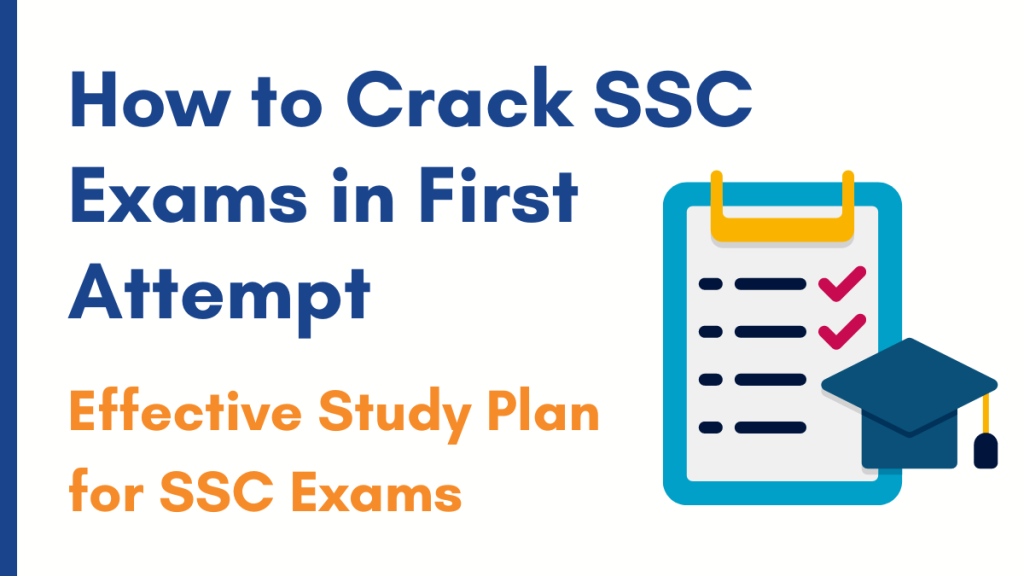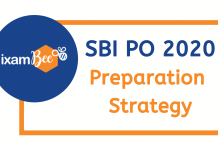The Staff Selection Commission (SSC) exams are some of the most sought-after government exams in India, opening doors to various prestigious positions within the central government. Every year, lakhs of aspirants appear for these exams, but only a few manage to crack them on the first attempt. The key to success lies not just in hard work but in smart work, strategic planning, and disciplined execution. In this blog, we will delve into an effective study plan that can help you crack the SSC exams on your first attempt.
To begin this journey, it is essential to understand that the SSC exam is not just a test of your knowledge but also of your time management, problem-solving skills, and ability to stay focused under pressure. A well-structured study plan, customized to your strengths and weaknesses, can make all the difference. In the following sections, we’ll break down the key components of an effective preparation strategy, guiding you step-by-step through the process—from understanding the exam pattern to mastering each section and ensuring you remain motivated throughout your preparation.

Understanding the SSC Exam Structure
Before diving into the study plan, it is important to understand the SSC exam structure. The SSC exams are divided into multiple tiers:
- Tier-I (Preliminary Examination): This is an online objective exam consisting of four sections—General Intelligence & Reasoning, General Awareness, Quantitative Aptitude, and English Comprehension.
- Tier-II (Mains Examination): Another online exam, Tier-II is more detailed and comprises papers like Quantitative Abilities, English Language and Comprehension, Statistics, and General Studies (Finance & Economics), depending on the post applied for.
- Tier-III (Descriptive Paper): This is a pen-and-paper mode exam, where candidates must write essays, letters, and précis in either English or Hindi.
- Tier-IV (Skill Test/Computer Proficiency Test/Document Verification): This stage is specific to certain posts and involves practical tests or document verification.
Step 1: Setting Clear Goals
The first step in cracking any exam is setting clear, achievable goals. Understand why you want to crack the SSC exam. Whether it’s for job security, prestige, or a passion for serving the nation, having a clear reason will fuel your motivation throughout the preparation process.
- Long-term Goals: These should be related to the overall objective of clearing the SSC exam on the first attempt. For example, completing the entire syllabus two months before the exam or scoring a specific percentage in mock tests.
- Short-term Goals: These are smaller, more manageable targets like completing a certain number of topics each week or revising a particular section every weekend.
Step 2: Understanding the Syllabus and Exam Pattern
A deep understanding of the SSC CHSL syllabus and exam pattern is non-negotiable. Familiarize yourself with the weightage of each section, the types of questions asked, and the time allocation for each section. This will help you in planning your study schedule effectively.
- General Intelligence & Reasoning: This section tests your logical thinking and problem-solving ability. Focus on practicing puzzles, analogies, series, coding-decoding, and syllogisms.
- Quantitative Aptitude: This is one of the highest-scoring sections. Ensure you are thorough with topics like algebra, geometry, trigonometry, and data interpretation.
- General Awareness: Stay updated with current affairs, and focus on static GK topics like history, geography, polity, and economics.
- English Comprehension: This section tests your command of the English language. Work on grammar, vocabulary, and reading comprehension.
Step 3: Crafting a Study Plan
A well-crafted study plan is the backbone of your preparation. Here’s a breakdown of a study plan that can help you maximize your chances of success:
1. Divide Your Time Wisely
- Daily Study Routine: Dedicate 6-8 hours a day to study. Divide your time among the four sections based on your strengths and weaknesses.
- Weekly Targets: Set weekly targets for completing specific topics or sections. For example, dedicate one week to mastering algebra and another to polish your English comprehension skills.
- Monthly Reviews: At the end of each month, review what you have learned. Take mock tests to assess your progress and identify areas that need improvement.
2. Study Material Selection
- Standard Books: Choose standard books for each subject. For instance, ixamBee’s “Quantitative Aptitude for Competitive Examinations” is a popular choice for Quantitative Aptitude.
- Online Resources: Utilize online platforms like ixamBee for video lessons, practice tests, and live doubt-clearing sessions.
- Previous Year Papers: Solve previous year question papers to get an idea of the exam pattern and difficulty level.
3. Incorporate Breaks
- Short Breaks: After every hour of study, take a 5–10-minute break to refresh your mind.
- Long Breaks: After 3-4 hours of continuous study, take a longer break of 30-45 minutes. This will help you maintain focus and avoid burnout.
Step 4: Focus on Conceptual Clarity
Memorization will not take you far in competitive exams like SSC. Instead, focus on understanding the concepts behind each topic.
- Quantitative Aptitude: Instead of rote learning formulas, understand the logic behind them. Practice different types of problems to build a strong foundation.
- General Intelligence & Reasoning: Work on developing a logical approach to solving problems. This will help you tackle even the trickiest questions.
- English Comprehension: Regularly read newspapers, magazines, and books to improve your reading speed and comprehension skills. Pay attention to grammar rules and practice regularly.
- General Awareness: For this section, understanding the context of current affairs is more important than just memorizing facts. Follow a reliable news source and make notes for quick revision.
Step 5: Regular Revision
Revision is the key to retaining what you have studied. Allocate time for revision in your daily schedule.
- Daily Revision: Spend at least 1-2 hours revising the topics you studied during the day. This reinforces your learning and helps in long-term retention.
- Weekly Revision: At the end of each week, revise the topics you covered during the week. This is especially important for sections like General Awareness, where information can be forgotten easily.
- Mock Tests and Practice Papers: Regularly attempt mock tests and solve practice papers under exam-like conditions. This will help you manage time effectively and build confidence.
Step 6: Stay Healthy and Manage Stress
Preparing for SSC exams can be mentally and physically taxing. To ensure you are at your best, pay attention to your health.
- Balanced Diet: A healthy diet can significantly affect your concentration and energy levels. Include fruits, vegetables, and nuts in your diet, and stay hydrated.
- Exercise Regularly: Engage in physical activities like walking, yoga, or sports to keep your body active and mind fresh.
- Adequate Sleep: Do not compromise on sleep. A well-rested mind is more efficient and productive.
Step 7: Time Management in the Exam
Effective time management can make or break your chances in the SSC exam. Here’s a strategy to help you manage time during the exam:
- Prioritize Sections: Start with the section you are most confident in. This will help you secure easy marks and build momentum.
- Time Allocation: Allocate a fixed amount of time to each section. For instance, spend 15-20 minutes on General Intelligence & Reasoning, 25-30 minutes on Quantitative Aptitude, 15-20 minutes on English Comprehension, and 10-15 minutes on General Awareness.
- Avoid Guesswork: Since SSC exams have negative markings, avoid wild guesses. Attempt questions only if you are reasonably sure of the answer.
- Review Your Answers: If time permits, review your answers before submitting the paper. This can help you catch any mistakes and make corrections.
Step 8: Use Technology to Your Advantage
In today’s digital age, technology can be a great ally in your SSC exam preparation.
- Mobile Apps: Use educational apps to study on the go. Apps like ixamBee offer mock tests, video lectures, and daily quizzes that can be accessed anytime, anywhere.
- Online Study Groups: Join online forums or social media groups where you can interact with fellow aspirants. Discussing doubts and sharing resources can provide fresh insights and motivation.
- YouTube Channels: Follow ixamBee’s YouTube channel for free tutorials, tips, and tricks for SSC exam preparation.
Step 9: Plan Your Last-Minute Revision
The final days before the exam are important. Here’s how you can utilize this time effectively:
- Revision Notes: Go through the revision notes you prepared. Focus on key concepts, formulas, and important facts.
- Mock Test Review: Analyze your performance in the mock tests you took. Identify any recurring mistakes and work on them.
- Relax and Stay Positive: Avoid cramming in the last few days. Instead, focus on staying calm and confident. Positive thinking can significantly impact your performance.
Step 10: Believe in Yourself
Finally, believe in yourself and your preparation. Confidence is half the battle won. Trust the process, stay focused, and give your best shot in the exam.
| Week | Subjects to Cover | Tasks | Revision |
| Week 1 | Quantitative Aptitude (Number System) | Practice problems, revise basic concepts | Daily revision of formulas |
| Week 2 | English Comprehension (Vocabulary & Grammar) | Learn new words, practice sentence correction | Weekly test on vocabulary |
| Week 3 | General Intelligence & Reasoning (Puzzles) | Solve puzzles, practice mock tests | Revise reasoning tricks |
| Week 4 | General Awareness (Current Affairs) | Read daily news, make notes | Revise current affairs notes |
| Week 5 | Quantitative Aptitude (Algebra) | Practice equations, solve previous year papers | Daily revision of concepts |
| Week 6 | English Comprehension (Reading Comprehension) | Practice reading passages, focus on speed | Weekly test on comprehension |
| Week 7 | General Intelligence & Reasoning (Series) | Solve series problems, practice mock tests | Revise common patterns |
| Week 8 | General Awareness (Static GK) | Study history, geography, polityc | Revise important facts |
| Week 9 | Quantitative Aptitude (Geometry) | Practice geometry problems, focus on diagrams | Revise important formulas |
| Week 10 | English Comprehension (Practice Papers) | Solve full-length practice papers | Review answers and mistakes |
| Week 11 | General Intelligence & Reasoning (Mock Tests) | Attempt full-length mock tests | Analyze performance |
| Week 12 | General Awareness (Mock Tests) | Attempt full-length mock tests | Revise weak areas |
Step 11: Analyze and Improve
Continuous improvement is essential during your preparation. Regular analysis of your performance will help you identify strengths and weaknesses. Here’s how you can go about it:
- Mock Test Analysis: After every mock test, spend time analyzing your performance. Identify the types of questions you got wrong and understand why you made those mistakes. Was it a lack of conceptual clarity, careless errors, or time pressure? Once you identify the issue, work on it.
- Performance Tracking: Maintain a log of your scores in various mock tests and practice papers. This will help you track your progress over time and stay motivated. Aim to gradually improve your scores with each test.
- Weakness Focus: Pay extra attention to the areas where you consistently score low. Dedicate more time to these topics, and don’t hesitate to seek help if needed. Remember, it’s not just about studying hard, but also about studying smart.
Step 12: Maintain a Positive Mindset
The journey to cracking the SSC exam is a marathon, not a sprint. It requires patience, perseverance, and a positive mindset. Here are some tips to help you stay positive:
- Visualize Success: Imagine yourself clearing the SSC exam and achieving your dream job. Visualization can be a powerful motivator, keeping you focused on your goal.
- Stay Away from Negativity: Surround yourself with positive people who support your goals. Avoid those who bring negativity or doubt your abilities.
- Celebrate Small Wins: Every time you achieve a short-term goal, celebrate it. These small wins will boost your confidence and keep you motivated.
- Stay Balanced: While it’s important to study hard, don’t forget to take care of your mental and emotional well-being. Practice relaxation techniques like meditation or deep breathing to manage stress.
Step 13: Post-Exam Strategy
After the exam, it’s important to have a post-exam strategy. Here’s what you should do:
- Evaluate Your Performance: After the exam, take some time to evaluate your performance. Reflect on how you managed your time, how confident you felt during the exam, and how well you were able to recall what you studied. This will be valuable if you need to prepare for future exams.
- Prepare for the Next Stage: If you’re confident about clearing the Tier-I exam, start preparing for the next stage immediately. Whether it’s the Tier-II exam, the descriptive paper, or the skill test, early preparation will give you an edge.
- Stay Updated: Keep an eye on the official SSC website for any updates regarding the results, answer keys, or next steps in the selection process. Being proactive will help you stay ahead of the competition.
Conclusion: Your Success is in Your Hands
Cracking the SSC exam on the first attempt is no easy feat, but with the right strategy, discipline, and dedication, it’s certainly achievable. Remember, the voyage is as important as the destination. Stay focused, believe in yourself, and keep pushing forward, no matter the challenges.
Your preparation for the SSC exam is a test of not just your knowledge, but also your determination, perseverance, and ability to stay calm under pressure. Stick to your study plan, adapt as needed, and approach the exam with confidence. Your hard work will pay off, and soon, you’ll find yourself one step closer to achieving your dreams.
Prepare for the SSC CHSL Exam with ixamBee’s expert-designed resources! Ace your preparation with our SSC CHSL Tier 2 Mock Tests, crafted to match the latest exam pattern. Boost your practice with SSC CHSL Tier 2 PYP for real exam insights. Enroll in the SSC SuperPack Online Course for complete guidance or target banking exams with our Target Banking Online Course. Start your journey to success with ixamBee today!
ixamBee specializes in providing expert guidance and resources for banking exams 2025, ensuring that you are well-prepared for the Upcoming Bank Exams like RBI Grade B, NABARD Grade B, IBPS SO, and more. Our courses align with the bank exam calendar 2024, covering all the essential topics. With a focus on the upcoming bank jobs, our Previous Year Papers, BeePedia, SSC CGL, SSC CHSL, SSC MTS and other Mock Tests are designed to help you excel in upcoming banking exams.
Also Read:
Is it possible to crack the SSC CHSL by solving only previous year question papers?
Best online mock test series for the SSC CHSL and SSC CGL
SSC CHSL: Salary, Job Profile, Postings and Career Growth Opportunities














